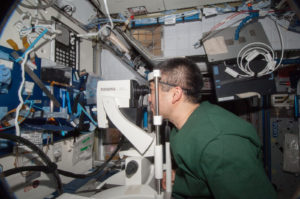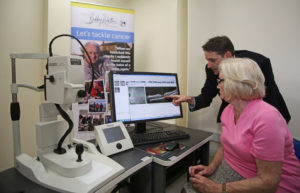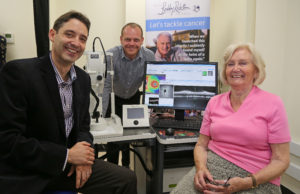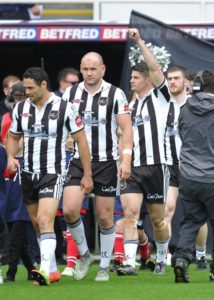‘SPACE STATION TECHNOLOGY’ FUNDED
A new eye evaluation suite, featuring technology also found on the International Space Station, is helping cancer patients thanks to funding from the Sir Bobby Robson Foundation.
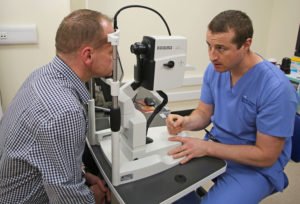
Brian O’Connor (Widnes Vikings) being assessed by Wayne Patterson (Senior Clinical Technologist) using the OCT
The Ophthalmology Clinical Trial Evaluation Suite at the Royal Victoria Infirmary in Newcastle is playing a crucial role in assessing the health and safety of patients undergoing trials of cancer drugs at the Sir Bobby Robson Cancer Trials Research Centre (also in Newcastle).
Two vital pieces of cutting edge equipment, costing a total of £120,000, have been funded by Sir Bobby’s charity – a visual fields evaluation machine and a state-of-the-art optical coherence tomography imaging device (OCT).
Dr Will Innes, from Corbridge, is leading the specialist team assessing the eye health of patients using the suite.
Their current focus is on monitoring patients being treated with innovative small molecule anti-cancer drugs, which are used to disrupt very specific ‘workings’ of cancer cells.
Dr Innes says: “Professor Plummer’s team at the Sir Bobby Robson Centre are working with a new generation of cancer drugs, which are incredibly powerful and a significant step forward in terms of cancer treatment.
“With these new drugs, the eye is ‘an organ at risk’ because some of the proteins or receptors that these drugs target in cancer cells are also expressed in the eye. So it’s essential that we closely monitor eye health during treatment and, with this new equipment, we can do that.
“Before we had this dedicated evaluation suite, patients had to visit two separate areas of the hospital to have their eyes assessed. In some cases, on a weekly basis.
“For any patient who is unwell, and especially for patients who are struggling to breathe comfortably because of cancer, it was very difficult to complete the eye checks necessary to continue on the drug”.
“If you can’t speak a full sentence without having to pause for breath, you can imagine how great a challenge having to take two trips across the hospital presented.”
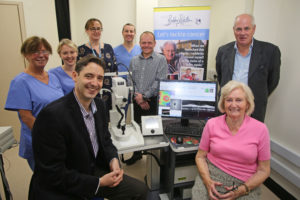
Dr Innes, Lady Elsie, Brian O’Connor and Andrew Robson and the Ophthalmology Clinical Trial Evaluation Suite team
The OCT machine (a Heidelberg Engineering SPECTRALIS) generates extremely high resolution images of the inside of the eyeball using coloured lasers that scan the retina up to 60,000 times per second. This creates ‘image slices,’ which are stacked to form 3D images of the retina and provide detailed maps of individual retinal layers.
A separate system, which was already in place at the RVI, records electrical signals from the eye, optic nerve and brain in response to visual stimuli. Responses are altered in a variety of ways by disease processes and drug toxicity, which affect the retina, optic nerve and higher visual pathways.
Together, the information from these two systems, along with the visual fields evaluation machine, produces what Dr Innes describes as an “exquisitely detailed” picture of the patient’s eye structure and function, allowing oncologists to react very quickly to any changes.
Importantly, this surveillance ability can enable patients to continue with therapy that without appropriate monitoring would simply be too risky.
Dr Innes adds: “We have the same OCT system that is on board the International Space Station, which gives you an idea of how advanced this equipment is.
“In order to keep developing these drugs and drive these therapies forward we need to work closely with our oncology colleagues to make sure that patients’ eyes are kept safe whilst they are on these medicines.
“We can then communicate that back to the team in the Sir Bobby Robson Centre and let them know if they need to adjust the dosage of the drug to help ensure vision is preserved and without having to stop their therapy, which in many cases is life-lengthening.
“Oncologists are traditionally trained to deal with treatment side effects, such as hair falling out, mouth and bowel problems and the dropping of white blood cell counts. That’s been standard training for the last few decades as training has centred around conventional cancer therapies.
“These new treatments require a different approach. Ophthalmology is now an essential element of new cancer treatments and the key is not only in having a very close working relationship with our oncology colleagues but also having the ability to undertake such detailed ocular evaluations
“I feel grateful that, with this unit, that’s exactly what we have. And I’m very grateful to everyone who has helped the Sir Bobby Robson Foundation fund this new suite for the benefit of all our patients.”
Lady Elsie and son, Andrew Robson, were fascinated to see at first hand the detail produced using the new eye evaluation equipment.
Lady Elsie says: “Ensuring eye health is monitored and maintained is vital for anyone. And it’s especially important when someone is facing a life-threatening illness that makes them vulnerable.
“This marvellous new equipment will help push forward the new drug trials and also make things easier for cancer patients. We’re very proud to have been able to fund it and I hope our wonderful fundraisers feel the same way.”
Lady Elsie and Andrew Robson were joined by Widnes Vikings Director, Brian O’Connor, to officially open the Ophthalmology Clinical Trial Evaluation Suite.
The Super League team and its fans together raised over £80,000 with three fundraising campaigns based around the Magic Weekends held at St James’ Park – a good proportion of the money required to fund the suite.
Brian O’Connor says: “The work that the Sir Bobby Robson Foundation undertakes is truly remarkable and for us, as a professional sporting organisation, it is an honour to feel that we are part of such an incredible team.”
“Our supporters, at every level, have embraced our journey with the Foundation throughout the last three years and it is remarkable that their efforts have contributed significantly to the project.
“The infrastructure in place will not only allow aid the treatment of patients in the North East, it will also significantly develop the trials of new medicine to combat cancer, which will be of a benefit to a much wider reach.
“I would like to thank the Widnes Vikings fans along with the Rugby League family for supporting our initiatives for such an incredible cause.”
